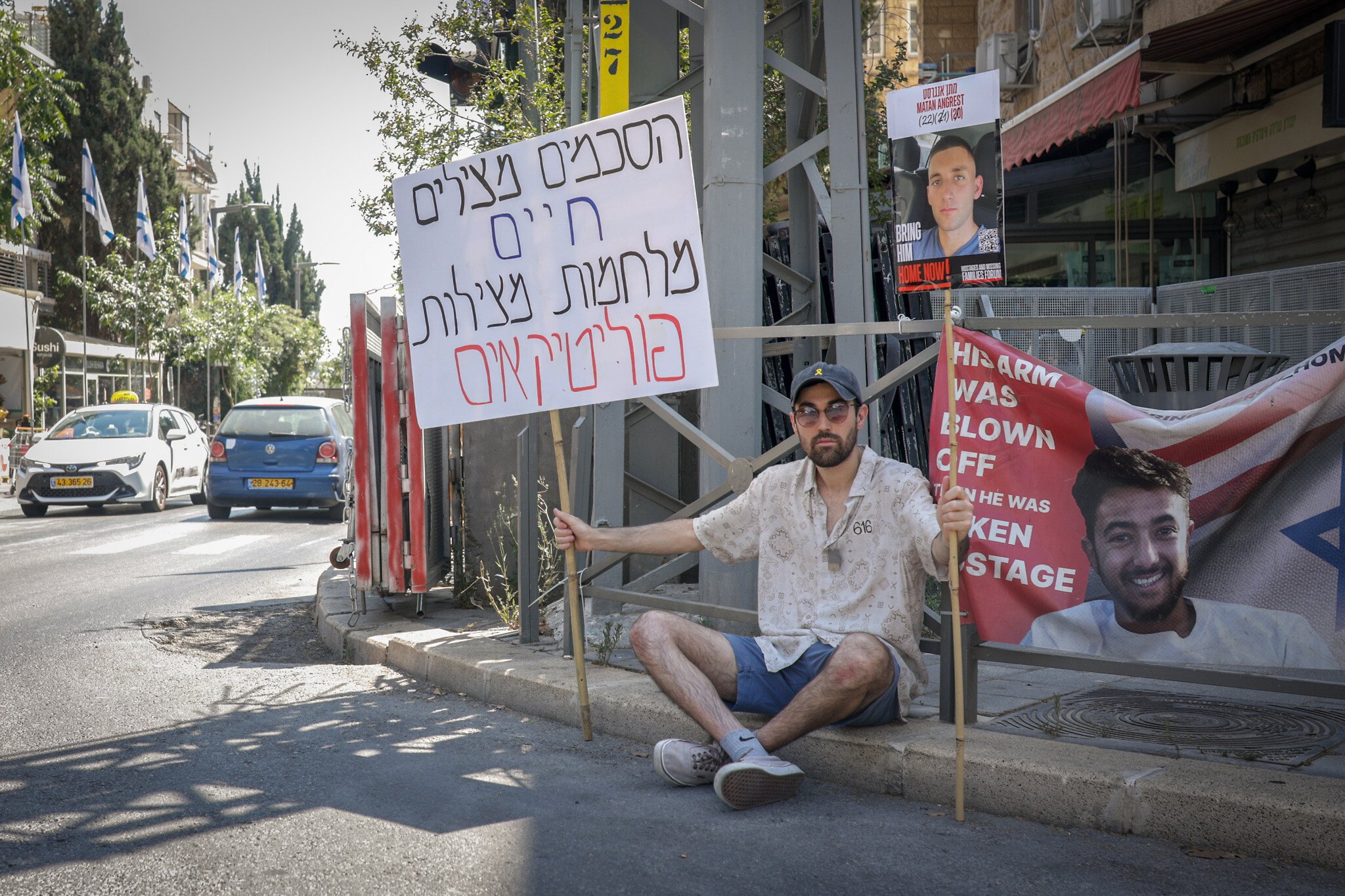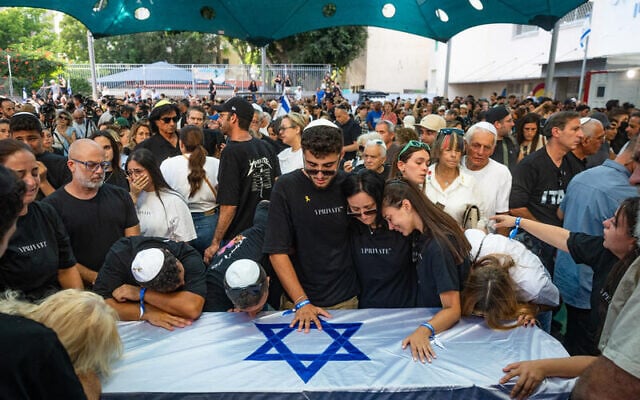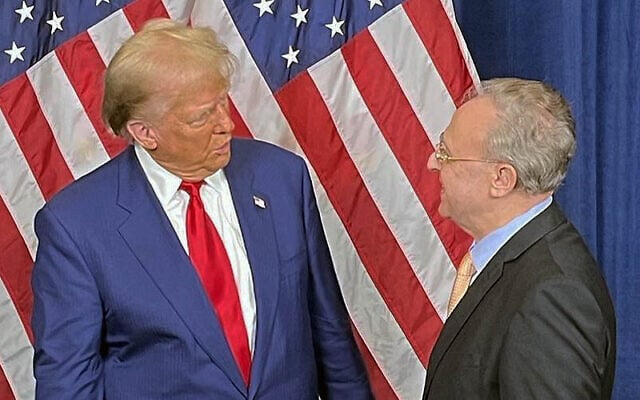



The Palestinian-American political activist who has been mediating between the Trump administration and Hamas said Tuesday that it was possible to reach a Gaza ceasefire and hostage release deal “within days.”
Bishara Bahbah, who is mediating alongside Egypt and Qatar, said in an interview with the Jordanian Al Ghad TV channel that he was optimistic about the chances for a deal following the ceasefire struck hours earlier between Israel and Iran, arguing that it put Gaza back atop the regional agenda.
However, a senior Arab diplomat told The Times of Israel that he was not as optimistic, explaining that Israel has not budged from its refusal to provide an upfront commitment to permanently end the war.
Israel has instead offered to spread out the release of hostages throughout the temporary ceasefire on the table, as Hamas has demanded, but the sequencing of the releases is not a critical issue blocking a deal, the Arab diplomat said.
While Bahbah clarified in his Tuesday interview that the Israel-Iran war is not linked to the fighting in Gaza, he said that Qatari and Egyptian mediators are now determined to secure a deal that ends the latter conflict now that the former has been settled. Qatar played a key role in mediating the Iran ceasefire.
Bahbah asserted there were very few remaining disagreements between Israel and Hamas and that the main dispute was over the wording of a particular sentence, an ostensible reference to the clause pertaining to the end of the temporary ceasefire and whether it would be extended if the sides have not reached an agreement on the terms of a permanent ceasefire, as Hamas is demanding.
The Al Ghad interview was held in Egypt, where Bahbah had traveled from Doha in order to advance an agreement. Since arriving in Cairo, he met with senior Hamas official Ghazi Hamad in order to discuss remaining gaps.
Egypt has been seeking to host delegations from Israel and Hamas in Sharm el-Sheikh to advance long-stalled negotiations, an Arab diplomat and a second source familiar with the matter told The Times of Israel last week.
Egypt proposed hosting the meeting in Sharm el-Sheikh, which does not require Israeli officials to fly there, amid the then-ongoing conflict between Israel and Iran.
But the two sources said Israel was holding off on sending a delegation to wait and see how the war with Iran developed, hoping that a further weakened Tehran would lead its Hamas proxy to soften its own positions.
The Arab diplomat cautioned against that happening, asserting that Hamas has not budged from its demand for an end to the war, amid repeated predictions from Israeli officials that various shifts in regional dynamics will lead the terror group to capitulate.
The two sources said last week that the US has yet to join Egypt in urging Israel to send a delegation to Sharm el-Sheikh, accepting Jerusalem’s desire to see how the conflict with Iran played out.
Egypt is hoping to use Sharm el-Sheikh as a platform for proximity talks on remaining disagreements in negotiations, including the flow of humanitarian aid, the redeployment of Israeli troops and the transition from a temporary ceasefire to a permanent one, the source familiar with the matter said.
Bahbah said Tuesday there were several hostage deal proposals under discussion, with some being comprehensive and others being partial. He stressed that one of the key goals is to secure a surge of humanitarian aid into the Strip, given that Israel has only been allowing an average of roughly 60 trucks per day over the past month, far below the hundreds that the UN says are needed to address the humanitarian crisis.
The Palestinian-American mediator said he is in regular contact with Steve Witkoff and recalled how the US envoy told him when they started working together several months ago that their primary goal is to “stop the killing of Palestinians and Israelis.”
Bahbah took note that Witkoff mentioned the Palestinians first in that sentence, saying the message served as the foundation of the trust that has been built between them.
Bahbah was pulled into the hostage negotiations earlier this year after Suha Arafat, the widow of former Palestine Liberation Organization chair Yasser Arafat, connected him with Hamad, who was looking to establish a line of communication with the Trump administration.
Bahbah is not a US official, but he headed Arab American for Trump during the previous election campaign and has ties to various officials in the president’s orbit, along with officials throughout the Middle East.
Bahbah played an integral role in the May release of Israeli-American hostage Edan Alexander, urging Hamas to free the 21-year-old as a gesture of goodwill to the Trump administration in the hope that Washington would in turn coax Israel to end the war in Gaza.
Also on Tuesday, Qatari Prime Minister Mohammed bin Abdulrahman al-Thani expressed hope that indirect talks will be held in the coming days between Israel and Hamas as part of a renewed push to reach a hostage-ceasefire deal.
“Regarding the Gaza talks, discussions are ongoing with both the Israeli side and Hamas in an effort to reach an agreement based on the American draft,” said al-Thani, without giving details on what the proposal involves.
“We had achieved a lot in the past, but the Israeli escalation against Iran disrupted the process. However, we are still continuing our efforts, God willing, and we are trying to find an opportunity in the next day or two for indirect talks between the sides to reach an agreement,” he said.
The war in Gaza was sparked by the Hamas onslaught on October 7, 2023, in which thousands of terrorists killed some 1,200 people and took 251 hostages.
Terror groups in the Gaza Strip are holding 50 hostages, including 49 of the 251 abducted by Hamas-led terrorists on October 7, 2023. They include the bodies of at least 28 confirmed dead by the IDF. Twenty are believed to be alive, and there are grave concerns for the well-being of two others, Israeli officials have said. Hamas is also holding the body of an IDF soldier killed in Gaza in 2014.
The Hamas-run Gaza health ministry says more than 53,000 people in the Strip have been killed or are presumed dead in the fighting so far, though the toll cannot be verified and does not differentiate between civilians and fighters. Israel says it has killed some 20,000 combatants in battle as of January and another 1,600 terrorists inside Israel during the October 7 onslaught.
Israel’s toll in the ground offensive against Hamas in Gaza and in military operations along the border with the Strip stands at 433. The toll includes two police officers and three Defense Ministry civilian contractors.



